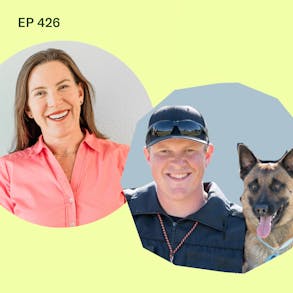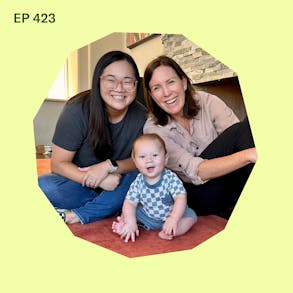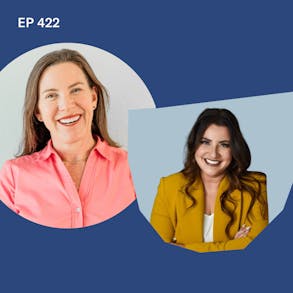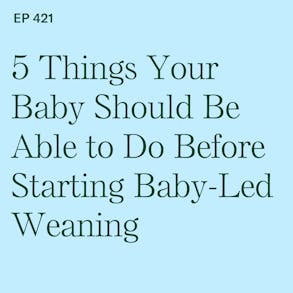How Do I Know if My Baby Needs Feeding Therapy with @msdawnslp Dawn Winkelmann, MS, CCC-SLP
- What sort of feeding issues warrant a referral to a feeding therapist...and what exactly does a feeding therapist do in a typical session with your baby?
- How does feeding therapy help babies who are struggling with the transition to solid foods get back on track to meeting their nutrition and developmental milestones?
- Who do I call or how do I get in touch with a feeding therapist if I think my baby would benefit...and will my pediatrician even know how to give me a referral for a feeding therapist?
LISTEN TO THIS EPISODE
Episode Description
When does a baby need feeding therapy? And how do I know if my baby needs feeding therapy? Even the phrase “feeding therapy” strikes fear into the heart of parents and caregivers…but feeding therapy is not a bad thing! In this episode I’m interviewing baby-led weaning expert and feeding therapist Dawn Winkelmann, MS, CCC-SLP to explore feeding therapy for infants.
Dawn and I co-teach a number of baby-led weaning programs together, but in this interview we’re exploring feeding therapy for babies. What are the signs of feeding disorders? Is my baby’s feeding issue normal or would we benefit from feeding therapy? Dawn is also discussing the different types of feeding therapy and why some of her clients only need a few sessions before getting back on track with baby-led weaning.
SUMMARY OF EPISODE
In this episode we’re talking about:
What sort of feeding issues warrant a referral to a feeding therapist...and what exactly does a feeding therapist do in a typical session with your baby?
How does feeding therapy help babies who are struggling with the transition to solid foods get back on track to meeting their nutrition and developmental milestones?
Who do I call or how do I get in touch with a feeding therapist if I think my baby would benefit...and will my pediatrician even know how to give me a referral for a feeding therapist?
ABOUT THE GUEST
Dawn Winkelmann, MS, CCC-SLP is a global expert in baby-led weaning, specialist in pediatric swallowing, award winning product designer and a feeding therapist! She is the product designer for ezpz, having designed their baby-led weaning spoon the Tiny Spoon, the Tiny Cup for babies 6-12 months, their Mini Cup + Straw System and numerous other leading baby-led weaning supplies.
As a feeding therapist Dawn sees babies with a variety of feeding disorders...many of which are preventable. Listen to learn how to help prevent needing to utilize feeding therapy - but also what to do in the event your baby would benefit from sessions with a feeding therapist.
LINKS from episode
Other BABY-LED WEANING MADE EASY podcast episodes Dawn has appeared on:
Purees + BLW with SLP Feeding Expert Dawn Winkelmann, MS, CCC-SLP
Episode 149: Pouches: Why Your Baby Doesn't Need to Suck Pureed Food Out of Pouches with @msdawnslp Dawn Winkelmann, MS, CCC-SLP
Episode 101: Straw Cup vs. Open Cups: Which Comes First? with Dawn Winkelmann, MS, CCC-SLP
Episode 64: Straw Cup vs. Open Cups: Which Comes First? with Dawn Winkelmann, MS, CCC-SLP
Episode 54: Overstuffing: What If My Baby Takes Big Bites? with Dawn Winkelmann, MS, CCC-SLP
Episode 40: 6 Reasons to Skip the Sippy Cup with Dawn Winkelmann, MS, CCC-SLP
Join Katie & Dawn’s 100 FIRST FOODS program. This is the only place where the 2 leading baby-led weaning experts help you safely select, prepare & offer your baby 100 SAFE baby-led weaning foods before turning 1. Program is only open for a limited time and you can sign up to join here.
TRANSCRIPT of episode
Katie Ferraro 00:00:00
Make sure that you ask your feeding therapist if you can be an active participant in the therapy sessions, I find that parents who are directly involved in the feeding therapy sessions have the best carry Over skills and their child graduates from feeding therapy much sooner.
Katie Ferraro 00:00:14
Hey, there I'm Katie Ferraro, registered dietitian, college nutrition professor and mom of seven specializing in baby led weaning. Here on the baby led weaning made easy podcast, I help you strip out all of the noise and nonsense about feeding, leaving you with the confidence and knowledge you need to give your baby a safe start to solid foods using baby led weaning. Well, hey guys, welcome back. Today we're going to be talking about feeding therapy and how do I know if my baby needs feeding therapy? I'm so excited to be joined by my good friend, feeding expert colleague, Dawn Winklemann.
Katie Ferraro 00:00:55
She is a speech language pathologist. You guys might know her on social. She's miss Dawn SLP, but she's also a real life feeding therapist. So she's going to be walking us through what happens at feeding therapy, who can be a feeding therapist. What are some conditions or situations where your baby might need feeding therapy and Dawn and I are actually co-teach a program together. That's all about baby led weaning and how to safely get your baby to eat 100 different foods before your baby turns one. Our program is called the a hundred first foods field guide. It's actually open for enrollment right now for a very short period of time. If you want to check it out, head to 101st foods.com. Dawn and I are there with you guys live every week, answering all of your questions in case you get stuck.
Katie Ferraro 00:01:39
And you're like, ah, does my baby need feeding therapy? Dawn's a feeding therapist. You're not doing feeding therapy inside of the program, but she can help you identify if there's a problem and then tell you what to do next. So again, check out the a hundred first foods program that Dawn and I teach together@onehundredfirstfoods.com. And now let's get started learning about how do I know if my baby needs feeding therapy. This is an interview with Dawn Winkelman at miss Dawn SLP. Well, hi Dawn. Welcome back. And thank you for joining me. You're like the most frequent guests on the podcast, but like I can never stop asking you back. Cause there's so many amazing things for us to talk about.
Dawn Winkelmann 00:02:13
Thank you so much, Katie. I love being here.
Katie Ferraro 00:02:15
All right. So today we're talking about feeding therapy. And so for those parents and caregivers who are listening, who are not familiar with the idea, could you talk about what feeding therapy is and how it can help with feeding disorders or feeding difficulties in our babies?
Dawn Winkelmann 00:02:29
Yeah. So feeding therapy is when a speech-language pathologist like myself or an occupational therapist who specializes in feeding and swallowing helps teach a child how to successfully pick up a food or pick up liquids, place food and liquids into their mouth, and then chew and swallow those foods or liquids. In-person therapy, feeding therapy typically occurs once or twice a week for about an hour at a time. Most of the therapy that I provide only requires just a few sessions since I'm the parents, these techniques that they can quickly learn and use at home. However, children with more complicated feeding issues may require several months of intensive therapy, but feeding therapy consists of assessing medical, developmental, sensory, motor, and even social factors, and then establishing a plan to help address these issues in order for the child to eat an age appropriate meal and for the parents to feel like they actually can enjoy mealtime and really understand what they need to help focus on if their child is having some difficulties.
Katie Ferraro 00:03:32
And one thing I know when I was a newer parent, when my quadruplets were in the NICU and there was lots of different things going wrong because they were premature. There's different therapies being recommended. I remember like just hearing them talking about therapy and my blood pressure would shoot up, but it's just sounds like such a scary thing if you're not familiar with it. But one thing that I love that you always accentuate is that sometimes if a problem is identified and there is either a diagnosis or there's a concern that sometimes like just a few feeding therapy sessions, a feeding therapist can help you identify what the problem is, give you some tools to help you in, like you can get past it, like your baby's not going to be in feeding therapy for life. I think that's important to remind parents. Cause sometimes they just shut down when you say feeding therapy, cause they think it's going to be like a lifelong, you know, like diagnosis or something.
Dawn Winkelmann 00:04:15
It tends to be intimidating. And I think it's intimidating for two reasons. One is because no one talks about it or people think that anyone can kind of give, you know, picky eating tips, right? When there's actually a license credentialed specialty, you know, for speech pathologists or occupational therapists to do, if your child is having some feeding difficulties and you go to your pediatrician, your pediatrician is going to write a referral for a speech language pathologist or occupational therapist to actually assess your child. So we're the medically trained experts to be able to help parents kind of overcome this, but you're right. It's sometimes is just an assessment, just giving parents a couple of tips and techniques and then they're on their way.
Dawn Winkelmann 00:04:56
What's really important about what you just said, Katie, is at that early intervention is the key. So kind of finding that early and then having parents say, oh, you know what? I think this is something I'm concerned about. Then it could just take one session sometimes to be able to kind of get them on the right track and say, oh, instead of feeding the baby, let your baby feed themselves. And sometimes everything just stops and just goes down the normal developmental path that you know, the parents were hoping for at the very beginning,
Katie Ferraro 00:05:23
Dawn, what are some of the signs that usually determine whether a baby needs feeding therapy or not? Or what should parents be on the lookout for if they think their baby needs feeding therapy? Like what are the tell-tale signs, I guess from your experience?
Dawn Winkelmann 00:05:35
So if your child is having difficulties eating, if they're having some choking episodes, trouble swallowing, refusing textures, or if you feel the need to increase their food or liquid intake, then your family may benefit from feeding therapy. When treating infants feeding therapy helps babies who are having difficulty sucking or chewing or feeding themselves or swallowing the foods were transitioning to solid safely. But the earlier we begin treating those problems, the better the baby's growth will be their nutrition and their future eating outcomes will be sometimes feeding therapy may again only take one or two sessions. So I want to encourage parents not to be afraid to ask for help.
Katie Ferraro 00:06:14
And what are some strategies for families that are going through feeding therapy? I can imagine this is a very stressful time. What can we do to support a baby who is currently receiving therapy or is having difficulty feeding?
Dawn Winkelmann 00:06:25
I have a couple of tips here, but the biggest one is to make sure that you ask your feeding therapist, if you can be an active participant in the therapy sessions, I find that parents who are directly involved in the feeding therapy sessions have the best carry over skills and their child graduates from feeding therapy much sooner. So be sure to talk to your speech language pathologists or occupational therapists and see if you can implement some of the feeding strategies that they show you and implement them in front of the therapist. So you feel really confident and they can give you some feedback so that you're more comfortable using those strategies at home. I think this hands-on approach to feeding therapy is so important because then again, it cuts down on the amount of feeding therapy and it allows parents to feel really independent when they go home.
Dawn Winkelmann 00:07:09
I also tell parents to ask for homework and that sounds crazy, but I give all the parents that I work with homework assignments that are manageable and easy for them to incorporate in their day. These can be small things like encouraging them to do oral care before a meal, or which actually would help, you know, their baby fill their gum line and be able to, from a sensory standpoint, understand where that piece of food is. And it will actually allow the baby to chew better, like something little like this can actually help a parent move through that successful path of feeding and not having to have their child be in feeding therapy for long periods of time. And then my last tip here would be to purchase products that you actually see working in the feeding session with your therapist.
Dawn Winkelmann 00:07:50
So if they're using, for example, an EzPz tiny spoon and your baby is actually rocking out, self-feeding when they're in feeding therapy, but they're not doing that at home. Well, then you can snag that tool and be able to say, well, I'm going to purchase that product and have that at home. So again, you're able to continue to add onto those goals and objectives that they're doing in feeding therapy and do that at home so that your child can have a quicker outcome.
Katie Ferraro 00:08:15
And I do want to add for those of you who might not be familiar with Dawn's role, she is in addition to being a speech language pathologist and an actively practicing feeding therapist, she specializes in pediatric swallowing. She's also a product designer. So she's the feeding expert for the company, EzPz. They make the original silicone suction mats and bowls. And Dawn now has designed all of their infant baby led weaning spoons. The baby led weaning utensils for older children. She does their open cups. So she knows all about the appropriate types of products that babies should be drinking out of and eating off of because she develops them for easy peasy. So if you go to easy-peasy fund.com, you can see all of their products. If you use the code, Katie10, you can get 10% off and know that Dawn, a feeding expert actually designed all of those products to make them appropriate for your baby's age and stage and make sure you're using the right product at the right age.
Katie Ferraro 00:09:03
Because we see that sometimes too, parents will see something in feeding therapy or that you're talking about Don, and they go buy the wrong size for their baby. We don't want to make any problems worse by using the wrong products at the wrong time. Right?
Dawn Winkelmann 00:09:14
Correct. Absolutely.
Katie Ferraro 00:09:15
All right. So I know as with therapy, you don't always get the perfect match with your first therapist. And I have so many parents that come to me and like Katie I'm in feeding therapy, they're really just not like clicking with the feeding therapist. I'm like, then go get another feeding therapist. Like if they're not helping the problem go away, don't blame the feeding therapy. I mean, they might just not be a connection with you or they might be practicing a different type of feeding therapy that you're not on board with or whatever. I don't want to get into like the particulars of the different types of therapy. But if someone's in feeding therapy and not connecting with their therapist or not happy with the outcome, how do you have the discussion to maybe move to a different therapist? Any tips there?
Dawn Winkelmann 00:09:47
Yeah. So I tell parents that speech language pathologist and occupational therapist are the trained medical professionals at assess diagnose and provide feeding and swallowing therapy. In 26 years of providing feeding therapy and being one of the leading experts on feeding, I've only seen one true behavioral feeding case in my entire career. All the other tens of thousands of clients that I've worked with have had feeding issues due to medical developmental, sensory, motor, or social factors. So I always encourage parents to interview their therapists, ask them about those issues, ask them how long they've been providing therapy, how many different feeding therapy approaches they know some therapists only have one approach under the belt.
Dawn Winkelmann 00:10:28
Well, you know, it's not a one size fits all. We need to have multiple approaches under our belt to be able to really specialize this. And then I asked parents to make sure that they are feeling like their child is having fun during feeding therapy. So your baby needs to have a smile on their face. They need to be enjoying the process. They need to really have that love connection. I call it with the therapist and they need to be learning these essential skills for eating in this fun way. If they're crying the entire time or they're being punished, if they're not eating, which is a technique that some people use, we don't want to expose your baby to that ends up having negative connotations to eating. We want positive experiences with food.
Dawn Winkelmann 00:11:09
And if your child is not getting that, you need to switch therapists. So it's really important for your parents to feel comfortable that they can actually switch. If you're getting services free from the state, you can ask the state to give you a recommendation of another therapist, or sometimes you could just actually have a conversation with that therapist and tell them what you're uncomfortable with. So I've had families who have said, you know, I really am not feeling comfortable with my feeding therapist and I'll say, well, have you talked to them about it? And they're like, no. And I'm like, talk to them about it. Like it's okay. It's okay for you to be able to say, you know, when she starts crying and you ignore her, like that makes me feel uncomfortable. I really want to be more responsive at meal time.
Dawn Winkelmann 00:11:51
And then sometimes the therapists, especially they're new and they don't have a lot of experience under the belt. It's really important for parents to have that feedback because they are a part of the team. In fact, the parents are the most important part of the feeding team, not necessarily the feeding therapist.
Katie Ferraro 00:12:06
So Dawn, one of the reasons why I just love having you on the podcast, you're such a wonderful resource for our parents is because you are a feeding therapist. As you mentioned, a speech language pathologist or an occupational therapist, who's specially trained in this area are the only credentialed professionals who can be feeding therapist. So people will say I'm a feeding expert, I'm a feeding specialist. But if we're talking about feeding therapy, we need to be making sure of course that we're getting our information from credentialed professionals. I'm a registered dietitian. I'm not eligible to be a feeding therapist. If someone said to me, Katie, how do I find a pediatric dietician to help my child who's having some growth failure issues? I would say, you go to eat right.org, the academy of nutrition and dietetics, and you type in your zip code. And then you find a dietitian. And then you select from those who are pediatric dietitians, but in your field, Dawn, how do parents find a feeding therapist?
Katie Ferraro 00:12:51
Where do we point them in the right direction? If they think their the pediatrician says you need a referral to feeding therapy, but I don't know any feeding therapists, because most pediatricians it's like tragic, but they don't know any feeding therapists, where can parents go to be proactive?
Dawn Winkelmann 00:13:02
So true. For babies a parent can reach out to their state agency for a free feeding evaluation. The problem with that is the waitlist. Often these free services have a waitlist that's, you know, hundreds long, and it could take several months to have your child evaluated. And we knew that immediate intervention of feeding concerns per you know, gives the best outcomes. So at times these agencies may send out a professional too. That may be someone other than a speech language pathologist or occupational therapist. And they're not qualified to make a decision on whether or not the baby would benefit from therapy or not. But a consistently see parents saying, you know, I went to the state provider and they had a social worker come out and say, you know, my child doesn't qualify for therapy.
Dawn Winkelmann 00:13:43
I'm like, that's not the right professional to be able to do that. So it's really important for parents to be sure that they are educated and know who they need to ask for. So they can go to their pediatrician and say, I feel like my baby's having a feeding or a swallowing issue. And I'd like you to write me a referral to a speech language pathologist or occupational therapist. And then the state can actually really help them in some of those services are free. Others, you can, you know, parents can also reach out to a speech language pathologist or occupational therapist in private practice, and they will come to your house and give your child therapy in your home. Most of those therapists though, unfortunately, don't take insurance. So some of these options may be a private pay option, but again, your child may only need a few sessions.
Dawn Winkelmann 00:14:24
And that early intervention is so important. Parents can also reach out to me as I provide in-person and virtual services as well.
Katie Ferraro 00:14:31
So, Dawn, I know right before interview, you just got done. You were actually late, I'm not calling you out for being late, but you were finishing up a feeding therapy session with a client without disclosing or divulging any personal information or HIPAA violation stuff. Could you just give us like the high level view, like what'd you do in that feeding therapy session?
Dawn Winkelmann 00:14:47
So with this particular mom, she reached out and she described her baby as a picky eater. And parents tend to do that often because they don't know how else to describe the issues that they're seeing. But this parent was seeing that their baby was having difficulties grabbing the food, difficulties drinking from an open cup and having some difficulties swallowing and having that foods fall out of their mouth. So as an expert in feeding, all of these issues represent a variety of different difficulties, delays and disorders. But for parents who are in desperate need of help at mealtime, they tend to label this as like picky eating. And so with this particular mom, she, you know, reached out and just kept saying my baby's a picky eater and really we needed to work on lip closure activities.
Dawn Winkelmann 00:15:31
So what we were talking about is how you can really improve lip closure on a spoon, improve the lip closure on a cup and being able to use an open cup and a spoon at mealtime that your baby controls to help really facilitate that lip closure. So now the food isn't falling out the mouth anymore, and this is also encouraging this child to actually breathe through their nose instead of breathing through their mouth, which also has food coming out of their mouth. Then I also gave the parent tips of switching from the different types of cups that they were drinking out of. So in this particular case, you wouldn't be surprised or did you get out of a sippy cup? And then we went through how to be able to use an open cup successfully to really work on all of those skills.
Dawn Winkelmann 00:16:12
And I bet that in the next week or two of the mom's going to reach out to me and let me know that, you know, most of those concerns that we were both having of have been stopped and that they're successful at mealtime.
Katie Ferraro 00:16:24
Well, Dawn, thank you so much for coming on to talk about feeding therapy as always, it's a pleasure to speak with you. I think you do such amazing work as do all of your feeding therapist, colleagues. Thank you so much.
Dawn Winkelmann 00:16:33
Well, thank you so much for having me, Katie.
Katie Ferraro 00:16:36
Well, I hope you guys enjoyed that episode about feeding therapy with Dawn Winklemann. She's one of my favorite people on the planet, both as a real life friend, a work friends, such a great wealth of knowledge. We actually have a program that we co-teach together. That's open for enrollment right now. It's called the hundred first foods field guide. We are two baby led weaning experts who deemed up together to help you walk your baby through safely, selecting, preparing, and then offering a hundred safe baby led weaning of foods. And what's so cool about this program is that Dawn and I have a live component. So we're there each week answering all of your questions. If you get stuck with baby led weaning, cause I know there's so much info out there about baby led weaning, but having the opportunity to ask two baby led weaning experts, your exact questions about your baby is such a unique opportunity.
Katie Ferraro 00:17:24
So if you want to check out the program, head to 101st foods.com, the program is open for enrollment for just a short period of time. Dawn and I do this just a few times each year. We've got a great group of parents already ready to go. We'd love to have you guys come join us. And if anything goes wrong along the way, when you're doing baby led weaning, or you find yourself getting stuck, you can ask us. Dawn, will let you know if you think your baby might a candidate for feeding therapy. A lot of times whatever's wrong might not require feeding therapy, but if it does, it's nice to know that you have someone there who can help you take that next step. So again, go ahead and check out the program at onehundredfirstfoods.com and hopefully we'll see you there.
Katie Ferraro 00:18:04
Thanks so much for listening and I'll see you next time. Bye now.

Latest Episodes






Get baby-led weaning recipes and tips delivered right to your email inbox.